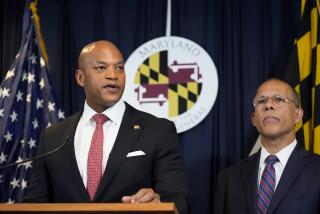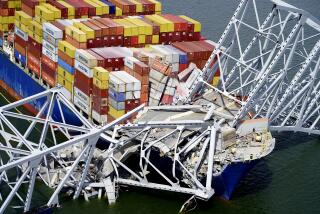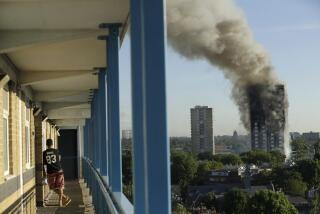North Sea Disaster Probe Cites Ferry Line’s ‘Sloppiness’
LONDON — A British judicial inquiry Friday blamed last winter’s North Sea ferry accident that claimed 188 lives on corporate sloppiness on the part of the ship’s owner and crew negligence.
After the three-month inquiry, Justice Barry Sheen concluded that the March 6 capsizing of the Herald of Free Enterprise car ferry off the Belgian coast was the fault of management of Townsend Thoresen Ltd..
“From top to bottom, the corporate management was affected by the disease of sloppiness,” the judge said.
Doors Not Closed
Sheen also named three crew members--the captain, the first officer and an assistant bosun--as sharing responsibility for the accident.
The ship, loaded with a full cargo and 543 passengers, sailed from Zeebrugge harbor in Belgium without closing the large bow doors through which automobiles are loaded, the inquiry concluded. As it approached the open sea, waves swept into the vast, open car decks and the ferry quickly lost its stability and capsized.
Only the immediate reaction of rescue crews from several countries and the fact that the ship settled onto a sand bar rather than sinking completely prevented a far larger loss of life, the inquiry found.
During the inquiry, evidence was given that the crew member responsible for closing the bow doors had fallen asleep in his cabin and that the captain and first officer had sailed without confirming that the doors had been closed.
On Friday, in his first interview since the disaster, the crewman responsible for the doors, assistant bosun Mark Stanley, gave an emotional extended statement on national television admitting his responsibility.
“I carry the guilt,” he said, staring at the floor. “I knew it was my responsibility to shut the doors, and I didn’t shut the doors.”
Sheen ordered the ship’s captain, David Lewry, suspended for one year and First Officer Leslie Sabel suspended for two years. But the judge saved his most scathing remarks for the Townsend Thoresen corporate management.
“Cardinal faults lay higher up in the company,” he said. “The board of directors did not appreciate their responsibility for safety of their ships. The directors did not have a proper comprehension of what their duties were.”
Loading Instructions Cited
He noted that the company had instituted differing, often confusing loading instructions at various cross-channel ports, that it had ignored crew requests for safety devices on the bridge that would confirm that the doors were closed and had not reacted to five previous known instances when ferries had sailed with the main bow doors open.
One request that door position indicator lights be installed on the bridge was rejected by management with a flippant note: “Nice, but don’t we pay someone to do this?”
The Herald of Free Enterprise was also found to have sailed from Zeebrugge with much more than its maximum allowable weight, although this did not trigger the disaster, Sheen said.
In a prepared statement Friday, Townsend Thoresen Chairman Peter Ford said the company’s management had been reconstituted and new operating and safety procedures had been implemented since the disaster.
Shortly after the results of the judicial inquiry were announced, Britain’s Transport Secretary Paul Channon announced new safety measures for cross-channel ferries, including criminal penalties for sailing with bow doors open.
More to Read
Sign up for Essential California
The most important California stories and recommendations in your inbox every morning.
You may occasionally receive promotional content from the Los Angeles Times.










